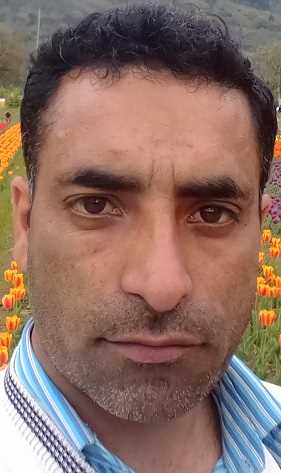
In the galaxy of eminent litterateurs, authors, poets and writers, Nishat Ansari stands as a towering and respectable name whose literary brilliance continues to inspire generations.
Born on 23 December 1930 (though official records mention 23 December 1928), his actual name was Gh. Mustafa Ansari, while his pen name remained Nishat. After matriculation, he was appointed to the Cooperative Department, but due to lack of interest he resigned and later joined the Education Department as a teacher. For 23 years, he served across the Valley in different capacities, remembered by his students for teaching them with the care of a father. In recognition of his dedication, the Government of Jammu and Kashmir conferred upon him the Best Teacher Award.
A multidimensional personality, Nishat Ansari never shied away from a literary challenge. Author of more than two dozen books, he was at once a poet, critic, researcher, translator and essayist. Five of his poetry collections were published during his lifetime, among them Gulnar, Nawan, Ablag, Aokus Boukus and Souz. His collection Gulnar won him the Best Book Award (1981) from the J&K Academy of Art, Culture and Languages.
For the Sahitya Akademi, New Delhi, he authored research monographs on Prof. Mohiuddin Hajini and Gh. Nabi Dilsoz, besides translating the revered saint Sheikh Noor-ud-Din Noorani’s (RA) poetic Shruks into Urdu under the title Salsabeel. He also translated works of Dr. Zakir Hussain and Jigar Muradabadi into Kashmiri, published by the Sahitya Akademi. Posthumously, the Akademi awarded him for his translation of Dr. Zakir Hussain’s book.
Over the years, Nishat Ansari remained deeply associated with prestigious institutions including All India Radio Srinagar, Sahitya Akademi New Delhi, J&K Academy of Art, Culture and Languages, Doordarshan Kendra Srinagar, Board of School Education, University of Kashmir and NCPUL.
Beyond an individual, Nishat Ansari was an institution in himself. He was the founder of Dayira Adab Delina Baramulla, and a basic member, Vice-President and long-serving General Secretary of Adbi Markaz Kamraz – the Valley’s largest literary organisation. For 30 years, his role in maintaining records, organising events, and compiling conference reports was widely admired.
He also penned nearly 300 research-based and critical essays published in reputed journals across Kashmir, India, and Pakistan. His autobiography, spanning more than 300 pages, will soon reach readers eager to explore the life of this literary giant.
On 25 May 2000, Nishat Ansari – a distinguished poet, critic and scholar of Urdu and Kashmiri literature – breathed his last. May his soul rest in eternal peace, and may Almighty Allah grant him the highest ranks in Jannah.
Email:------------------------------rayeeskumar31@gmail.com
In the galaxy of eminent litterateurs, authors, poets and writers, Nishat Ansari stands as a towering and respectable name whose literary brilliance continues to inspire generations.
Born on 23 December 1930 (though official records mention 23 December 1928), his actual name was Gh. Mustafa Ansari, while his pen name remained Nishat. After matriculation, he was appointed to the Cooperative Department, but due to lack of interest he resigned and later joined the Education Department as a teacher. For 23 years, he served across the Valley in different capacities, remembered by his students for teaching them with the care of a father. In recognition of his dedication, the Government of Jammu and Kashmir conferred upon him the Best Teacher Award.
A multidimensional personality, Nishat Ansari never shied away from a literary challenge. Author of more than two dozen books, he was at once a poet, critic, researcher, translator and essayist. Five of his poetry collections were published during his lifetime, among them Gulnar, Nawan, Ablag, Aokus Boukus and Souz. His collection Gulnar won him the Best Book Award (1981) from the J&K Academy of Art, Culture and Languages.
For the Sahitya Akademi, New Delhi, he authored research monographs on Prof. Mohiuddin Hajini and Gh. Nabi Dilsoz, besides translating the revered saint Sheikh Noor-ud-Din Noorani’s (RA) poetic Shruks into Urdu under the title Salsabeel. He also translated works of Dr. Zakir Hussain and Jigar Muradabadi into Kashmiri, published by the Sahitya Akademi. Posthumously, the Akademi awarded him for his translation of Dr. Zakir Hussain’s book.
Over the years, Nishat Ansari remained deeply associated with prestigious institutions including All India Radio Srinagar, Sahitya Akademi New Delhi, J&K Academy of Art, Culture and Languages, Doordarshan Kendra Srinagar, Board of School Education, University of Kashmir and NCPUL.
Beyond an individual, Nishat Ansari was an institution in himself. He was the founder of Dayira Adab Delina Baramulla, and a basic member, Vice-President and long-serving General Secretary of Adbi Markaz Kamraz – the Valley’s largest literary organisation. For 30 years, his role in maintaining records, organising events, and compiling conference reports was widely admired.
He also penned nearly 300 research-based and critical essays published in reputed journals across Kashmir, India, and Pakistan. His autobiography, spanning more than 300 pages, will soon reach readers eager to explore the life of this literary giant.
On 25 May 2000, Nishat Ansari – a distinguished poet, critic and scholar of Urdu and Kashmiri literature – breathed his last. May his soul rest in eternal peace, and may Almighty Allah grant him the highest ranks in Jannah.
Email:------------------------------rayeeskumar31@gmail.com
© Copyright 2023 brighterkashmir.com All Rights Reserved. Quantum Technologies